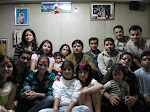 Kunda Dixit in Athens...................
Kunda Dixit in Athens...................(Background: A policeman shoots dead a teenager. Protesters start burning tyres on the streets. The political parties, their student unions and masked youth fight pitched battles with riot police, bringing the capital to a standstill. A chukka jam are declared at main intersections, and when that doesn't work a nationwide bandh brings the country to a standstill, shutting schools and trapping tourists in their hotels)
A Nepali visitor would be forgiven for feeling at home. But this is Greece. The cradle of democracy that this week descended into anarchy. Police fired tear gas into crowds outside the neo-classical parliament building in the centre of Athens which looked like a battle zone. In the city below the acropolis, where ancient Greeks came up with the world's first system of government accountable to its people, the streets are littered with hulks of hundreds of burnt out cars. On the fashionable Ermou street, every branded clothing store has shattered windows, many buildings ignited by molotov cocktails are still smouldering.
The English word 'ostracism' comes from the Greek, and an ancient practice for the people's representatives to write the name of the least desirable leader on a piece of pottery and vote. A leader who gets the most number of negative votes is not allowed to rule and is banished from being elected for five years. Such checks and balances made Greek democracy a model, but it wasn't perfect, like no form of democracy is. Even in antiquity the practice of ostracism was already being mis-used by political factions to engineer the ouster of rivals.
They say it takes time for democracy to mature, for citizens to inculcate a culture of responsibility and for rulers to respect the people's mandate. Well, here in Greece it has been 2,500 years and they are still working at it. If such spectacular governance failure and social chaos can happen in a EU member state, it almost makes us in Nepal not want to complain to much about our fledging democracy that seems to go into relapse every time it has been revived since 1960. And if Greece can descend into chaos, Bangkok airport be closed for a week, then Nepal doesn't look so bad.
But there are lessons: unless politicians address inequality and the economic crisis, the fires of anarchy can ignite anywhere anytime. The roots of the Greece unrest this week is symptomatic of how the global recession can affect any country in the world as jobs are cut, prices rise and young people see no future. In Paris, France, Copenhagen, London and Berlin, all it needs is a spark from Athens for this anarchy to spread across Europe.
This commentary by Alexis Papachelas in the Kathimerini newspaper in Athens, on Wednesday is typical of the feeling here. Just replace the word Greece with Nepal, and it could almost be in the Nepali media:'Greece in self-destruct mode I feel a deep sense of despair as I watch my country Greece roll down an endless hill? This is a country with a state in shambles, a police in disarray, mediocre universities that serve as hotbeds for rage instead of knowledge and a shattered healthcare system. It is also on the brink of financial ruin?the government bears a tremendous responsibility?because this is a leaderless state, and engaged in a debate not about what needs to be done but about the same stupid things that have held us back for so long.'
(Source: Nepalitimes)


No comments:
Post a Comment